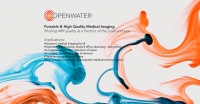In 2008, Kurion founder and former president of Nukem Corp. John Raymont teamed up with New York-based venture fund Lux Capital to solve a problem in nuclear that no one was else looking to challenge: radioactive waste treatment. While the future of nuclear was unknown at the time, one thing was certain: whether the industry grows, stagnates, or shrinks, someone’s going to have to clean up the radioactive waste left behind.
At the time and even today, industry standard technologies for waste cleanup involve ion exchange resins – essentially beads used to remove radioactive atoms from contaminated liquids. The challenge with this technology is that it is highly sensitive to environmental conditions such as acidity, salinity, and the presence of surfactants, rendering it ineffective in many situations.
“Kurion’s inorganic Ion Specific Media works as a molecular sieve and adsorbent versus the ionic exchange process with resins, so its extraordinary performance as an isotope sorbent in aqueous solutions is not negatively impacted by salt water and other common interferents,” said chief technology officer Mr. Mark Denton. “Our design goal was to create an engineered mineral that would be uniquely robust across a wide range of operating parameters and to be compatible with existing nuclear power plant water purification demineralization filtration systems as an ion exchange media replacement.”
Simply put – ISM is more precise than industry-standard ion exchange media because it only captures radioactive particles, instead of capturing all small particles. When paired with the unique characteristic of retaining the isotopes even after being melted and compressed into the gold-standard medium of nuclear waste disposal (vitrification), ISM becomes an industry-leading technology for radioactive waste cleanup.
When the Fukushima disaster hit in 2011, Kurion was the only company in the world posessing technology capable of decontaminating the irradiated seawater environment. A successful cleanup effort shined a spotlight on the budding company, and in 2016, Kurion was acquired by waste management giant Veolia for $350 million.





